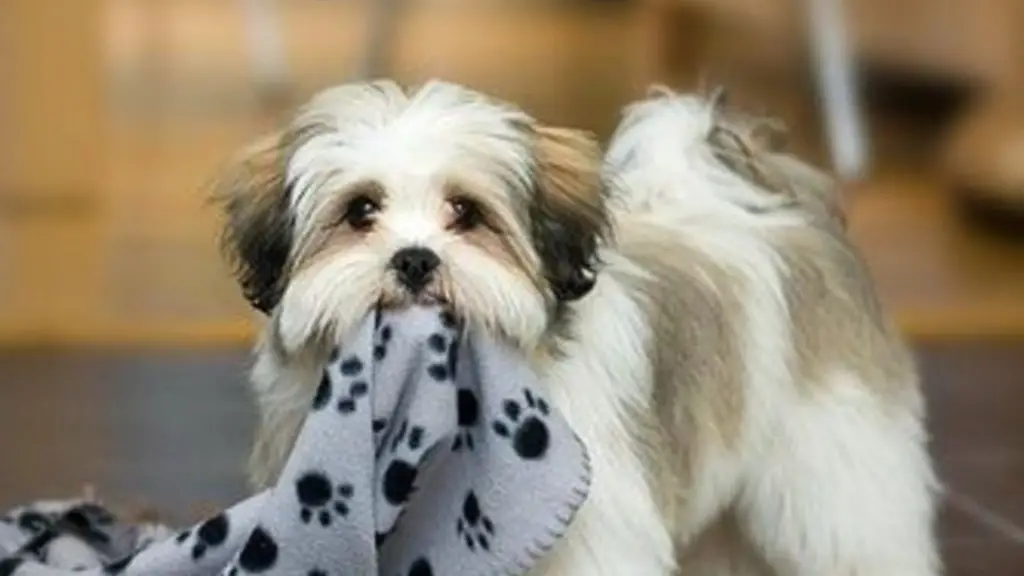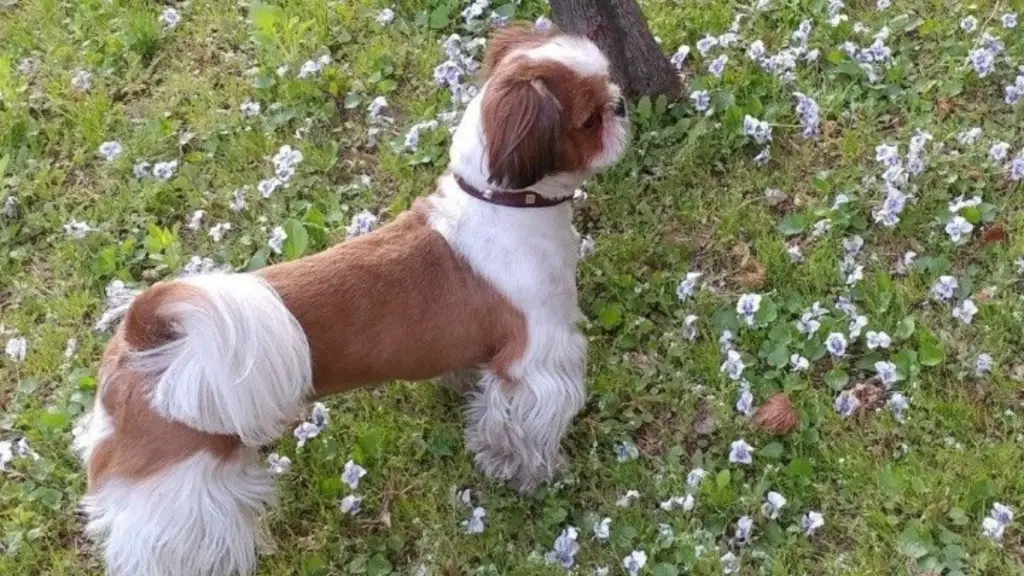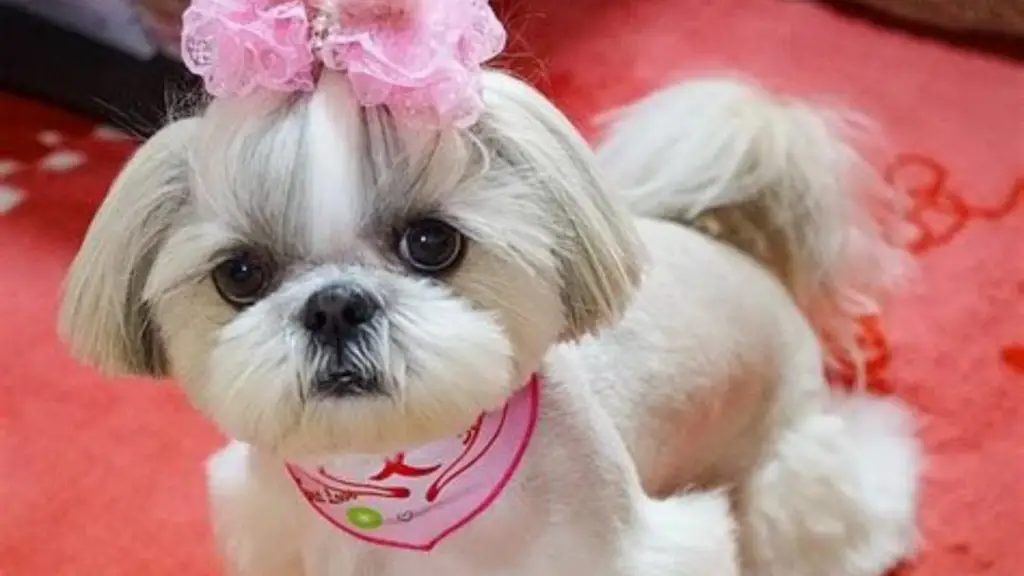
Understanding your Shih Tzu puppy’s behavior and development is crucial for providing the best care and ensuring a harmonious relationship. Shih Tzus are known for their affectionate and lively nature, but like all puppies, they go through various stages of development that influence their behavior. This comprehensive guide will explore the key aspects of Shih Tzu puppy behavior and development, offering insights into what to expect and how to support your puppy through each stage.
Early Socialization: The Foundation of Good Behavior

Early socialization is essential for Shih Tzu puppies. From a young age, puppies need to be exposed to a variety of experiences, people, and other animals. This exposure helps them develop into well-adjusted, confident adults who are comfortable in different situations.
Socialization should start early, ideally between 3 and 14 weeks of age. During this critical period, puppies are more receptive to new experiences and learn to adapt to different environments. Introduce your Shih Tzu puppy to various sounds, sights, and smells in a controlled and positive manner.
Positive experiences during socialization can prevent future behavioral issues. For example, exposing your puppy to different types of people, including children and adults, helps them become more comfortable around strangers. Consistent, gentle interactions with other dogs and animals also promote social skills and reduce the likelihood of fear or aggression.
Reward-based training is an effective way to reinforce positive behavior during socialization. Use treats, praise, and playtime to reward your puppy for calm and friendly interactions. Avoid overwhelming your puppy with too much stimulation at once; instead, provide a balanced mix of new experiences and familiar routines.
The Importance of Basic Training and Commands

Basic training is crucial for shaping your Shih Tzu puppy’s behavior and establishing good habits. Teaching essential commands such as sit, stay, come, and heel helps your puppy understand your expectations and respond to instructions. Consistent training from an early age sets the foundation for more advanced commands and behaviors.
Start with short, positive training sessions. Puppies have limited attention spans, so keep training sessions brief but frequent. Use positive reinforcement techniques, such as treats and praise, to encourage desired behaviors. Avoid harsh corrections or negative reinforcement, as these can create fear and anxiety.
Socialization and training go hand in hand. Incorporate training into socialization activities to reinforce good behavior in different settings. For example, practice basic commands while introducing your puppy to new environments or meeting new people. Consistency and patience are key to successful training, so ensure you are consistent with commands and rewards.
Gradually increase the difficulty of training exercises as your puppy masters basic commands. Introduce new commands and behaviors in a positive and manageable way, building on the skills your puppy has already learned.
Puppyhood Stages: What to Expect

Puppyhood is characterized by several developmental stages, each with its own set of behavioral characteristics and needs. Understanding these stages helps you provide appropriate care and support for your Shih Tzu puppy.
Neonatal Stage (0-2 Weeks)
During the neonatal stage, puppies are completely dependent on their mother for warmth, nutrition, and care. They are born blind, deaf, and unable to walk. Their primary activities involve eating, sleeping, and growing.
Puppies during this stage are developing basic physical abilities. Their sensory systems gradually begin to function, and they start to respond to external stimuli. Socialization and behavioral development are minimal at this stage, as puppies rely heavily on their mother and littermates.
Transitional Stage (2-4 Weeks)

The transitional stage marks the beginning of increased sensory and motor development. Puppies start to open their eyes and ears, and they become more responsive to their environment. They begin to explore their surroundings and interact with their littermates more actively.
Social behaviors start to emerge during this stage, including play fighting and exploring new textures. Puppies also begin to develop basic motor skills, such as walking and running. This stage is crucial for early socialization, as positive interactions with littermates and humans help shape their future behavior.
Socialization Stage (4-12 Weeks)

The socialization stage is a critical period for shaping your puppy’s behavior and personality. Puppies become more curious and eager to explore their environment. They begin to learn social cues and appropriate behaviors through interactions with their mother, littermates, and humans.
Positive socialization experiences during this stage are essential for developing a well-adjusted adult dog. Introduce your puppy to a variety of people, animals, and environments to help them become confident and adaptable. Avoid negative experiences, as they can lead to fear or anxiety later in life.
Juvenile Stage (3-6 Months)

The juvenile stage is characterized by increased independence and energy. Puppies continue to develop their social skills and become more curious about their surroundings. They may test boundaries and exhibit behaviors such as chewing and digging.
Training and socialization continue to be important during this stage. Provide plenty of mental and physical stimulation to keep your puppy engaged and prevent boredom. Consistent training helps reinforce good behavior and address any emerging issues.
Adolescent Stage (6-12 Months)

The adolescent stage is a time of significant growth and change. Puppies undergo hormonal changes and may exhibit increased stubbornness or rebellious behavior. They may test their limits and challenge their owners’ authority.
Maintain a consistent training routine to address any behavioral issues that arise during this stage. Provide regular exercise and mental stimulation to help manage your puppy’s energy levels. Be patient and persistent, as adolescence is a time of transition and growth.
Identifying and Addressing Behavioral Issues

Common Behavioral Problems in Shih Tzu Puppies
Shih Tzu puppies, like all dogs, can exhibit a range of behavioral issues. Common problems include chewing, digging, barking, and separation anxiety. Understanding the root causes of these behaviors helps you address them effectively.
Chewing and biting are common in puppies as they explore their environment and teethe. Provide appropriate chew toys and redirect their attention to these items to prevent destructive chewing. Supervise your puppy and use positive reinforcement to encourage appropriate chewing behavior.
Digging and barking can be signs of boredom or anxiety. Provide plenty of physical and mental stimulation to keep your puppy engaged and reduce these behaviors. Address separation anxiety by gradually increasing the time your puppy spends alone and providing comfort items.

Separation anxiety is a common issue in Shih Tzu puppies. Gradually acclimate your puppy to being alone for short periods and use positive reinforcement to reward calm behavior. Avoid making a fuss when leaving or returning home to prevent creating anxiety around departures.
Training Techniques to Address Behavioral Issues
Effective training techniques are essential for addressing behavioral issues in Shih Tzu puppies. Positive reinforcement is the most effective method for encouraging desired behaviors. Use treats, praise, and play to reward good behavior and create a positive association.
Redirect undesirable behavior by providing an alternative activity or toy. For example, if your puppy is chewing on furniture, redirect their attention to a chew toy. Consistency is key in training; ensure that all family members follow the same rules and use the same commands.
Seek professional help if behavioral issues persist or if you are unsure how to address them. A professional dog trainer or behaviorist can provide guidance and support tailored to your puppy’s specific needs.
The Role of Nutrition and Exercise in Behavior

Impact of Nutrition on Behavior
Proper nutrition plays a significant role in your Shih Tzu puppy’s behavior and overall health. A balanced diet provides the essential nutrients needed for growth, development, and energy. Feeding your puppy high-quality food helps support their physical and mental well-being.
Avoid overfeeding and ensure that your puppy’s diet is appropriate for their age, size, and activity level. Monitor your puppy’s weight and adjust their diet as needed to maintain a healthy body condition. Consult your veterinarian for recommendations on the best diet for your Shih Tzu puppy.
Hydration is also important. Ensure that your puppy has access to fresh, clean water at all times. Proper hydration supports overall health and can help prevent issues such as digestive problems or lethargy.
Importance of Regular Exercise

Regular exercise is crucial for your Shih Tzu puppy’s physical and mental development. Provide daily opportunities for physical activity to keep your puppy healthy and happy. Engage in activities such as playtime, walks, and interactive games to stimulate your puppy both mentally and physically.
Exercise helps manage energy levels and prevent behavioral issues associated with boredom or excess energy. Vary your puppy’s exercise routine to include different types of activities and environments. This helps keep your puppy engaged and prevents them from becoming bored.
Monitor your puppy’s exercise needs as they grow. Adjust the intensity and duration of exercise based on their age, size, and fitness level. Provide a safe and secure environment for exercise to prevent accidents or injuries.
Creating a Positive Environment for Development

Building a Safe and Comfortable Space
A safe and comfortable environment is essential for your Shih Tzu puppy’s development. Create a designated space for your puppy that includes a cozy bed, toys, and access to fresh water. Ensure that the space is free from hazards and provides a sense of security.
Establish a consistent routine for feeding, playtime, and rest. A predictable routine helps your puppy feel secure and understand what to expect throughout the day. Consistency in the environment supports your puppy’s emotional well-being and promotes good behavior.
Provide mental stimulation through interactive toys, puzzle feeders, and training exercises. Mental enrichment helps keep your puppy engaged and prevents boredom. Rotate toys and activities to maintain interest and provide new challenges.
Fostering Positive Interactions

Positive interactions with family members and other pets contribute to your Shih Tzu puppy’s social development. Encourage gentle and respectful interactions between your puppy and other pets or people. Supervise interactions to ensure that they are positive and stress-free.
Introduce your puppy to new experiences gradually and in a controlled manner. Positive reinforcement helps your puppy associate new experiences with rewards and pleasure. Avoid overwhelming your puppy with too many new experiences at once.
Provide opportunities for socialization through playdates, puppy classes, and outings. Socialization helps your puppy develop confidence and adaptability. Be patient and supportive as your puppy learns to navigate new situations and interactions.
Conclusion

Understanding your Shih Tzu puppy’s behavior and development is essential for providing appropriate care and support. From early socialization to training and managing behavioral issues, each stage of your puppy’s growth presents unique opportunities and challenges. By staying informed and using positive reinforcement techniques, you can help your Shih Tzu puppy become a well-adjusted and happy adult dog.
Providing a positive environment, consistent training, and proper nutrition all contribute to your puppy’s overall well-being. Remember to be patient and supportive as your Shih Tzu puppy navigates the various stages of development. With your guidance and care, your Shih Tzu puppy will grow into a loving and well-behaved companion.


